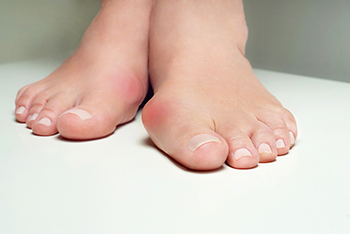

Bunions are bony bumps that form at the base of the big toe, often caused by a misalignment of the toe joint. This condition leads to the big toe angling toward the other toes, creating an uncomfortable and noticeable protrusion. Common symptoms include pain, swelling, and difficulty wearing certain shoes. Bunions can result from genetic factors, excessive foot stress, or wearing ill-fitting shoes. Treatment for bunions focuses on managing pain and slowing progression. Initially, this involves wearing properly fitting shoes with a wide toe box and using orthotic inserts to reduce pressure. Taking anti-inflammatory medications can help with discomfort. In more severe cases, where conservative measures fail, surgical options may be considered to realign the toe and correct the deformity. If you're experiencing symptoms of a bunion or need advice on managing foot discomfort, it is suggested you make an appointment with a podiatrist who can provide expert care and tailor treatment to your specific needs.
If you are suffering from bunions, contact Dr. Nooshin Zolfaghari of VIP Foot & Ankle Center. Our doctor can provide the care you need to keep you pain-free and on your feet.
What Is a Bunion?
A bunion is formed of swollen tissue or an enlargement of boney growth, usually located at the base joint of the toe that connects to the foot. The swelling occurs due to the bones in the big toe shifting inward, which impacts the other toes of the foot. This causes the area around the base of the big toe to become inflamed and painful.
Why Do Bunions Form?
Genetics – Susceptibility to bunions are often hereditary
Stress on the feet – Poorly fitted and uncomfortable footwear that places stress on feet, such as heels, can worsen existing bunions
How Are Bunions Diagnosed?
Doctors often perform two tests – blood tests and x-rays – when trying to diagnose bunions, especially in the early stages of development. Blood tests help determine if the foot pain is being caused by something else, such as arthritis, while x-rays provide a clear picture of your bone structure to your doctor.
How Are Bunions Treated?
If you have any questions, please feel free to contact our office located in Pembroke Pines, FL . We offer the newest diagnostic and treatment technologies for all your foot care needs.